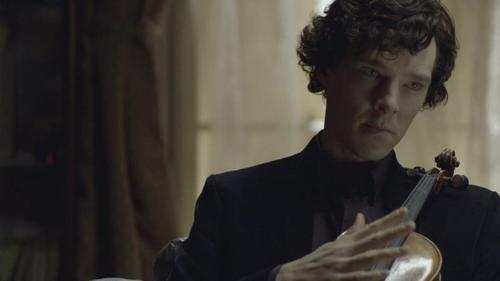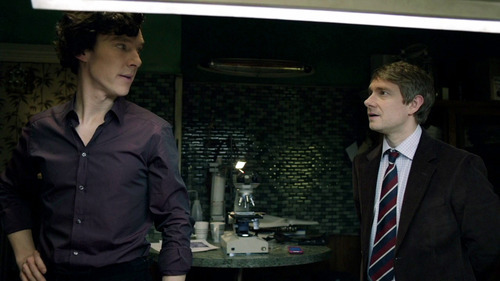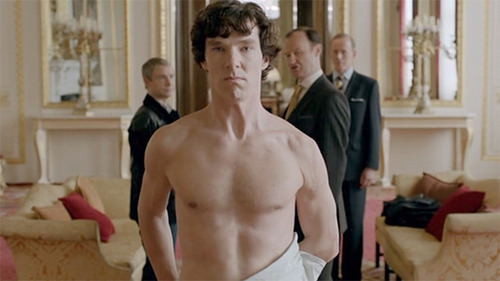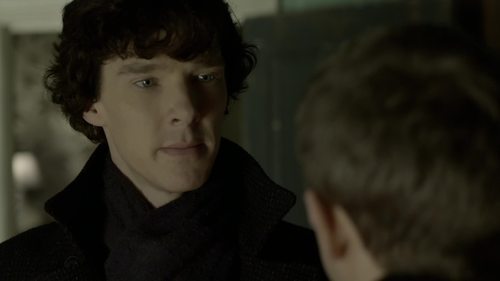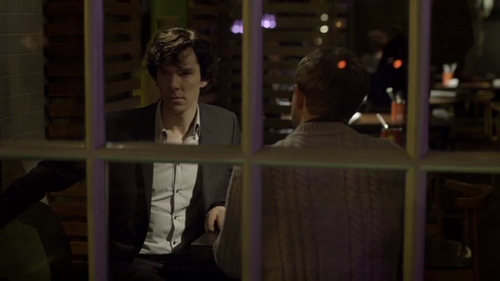Why the dismissal of women’s readings of Sherlock bothers me so much
Male showrunners and actors: They’re just friends. Why are you reading sex into this?
Female fans: They obviously want each other.
Male showrunners and actors: No they don’t. You’re hysterical and oversexualized and deluded.
Female fans: No we’re not. It’s OBVIOUS they desire each other.
Male showrunners and actors: NO THEY—
Female fans: YES THEY—
[ad infinitum]
Film and television are visual mediums. The text comes from what we see, not just the script, and definitely not extra-text commentary. Sherlock especially is a strikingly visual story that is all about looking.
Any woman with any sense of self-preservation spends her whole life learning to read the male gaze. The reason is not because women are constantly checking to make sure they are desirable (as many men like to think); the reason is because women have to. The consequences for not noticing when a male gaze equals “desire” are very dangerous, and so obvious I don’t even have to explain them. Any woman who walks through a parking lot at night, who has to spend her days avoiding a co-worker who sexually harrasses her but not enough to make it worth it to fight back, who deals with members of the public service who laugh at her when she is being threatened (I am thinking of that woman in San Francisco who tried to get a BART bus driver to call the police when a man was threatening to rape her and got ignored)—any woman who LIVES ON THIS PLANET has to learn to be aware of the male gaze and interpret it for signs of arousal and/or danger from a young age. This is SO MUCH BIGGER than “women want romance” or “women want love” or any of that ignorant shorthand for “women aren’t reading this show correctly.” It is definitely bigger than Sherlock.
If a man stood right in my personal space and stared into my eyes I would know how to interpret that. If a man licked his lips while staring at my face I would know how to interpret that. If a man belitted and chased off my romantic partners I would know how to interpret that. If a man asked me to reach into his jacket and pull out his phone I would damn well know how to interpret that. Any time I have tried to brush aside suspicions under these circumstances, I was proved right that I should have trusted my instincts, and I wound up in dangerous situations (luckily, nothing terrible resulted thanks to being able to escape, but the danger was real). If I’m wrong, I’m wrong, but at least I don’t get locked in a basement in Cleveland for a decade. Women have to err on the side of caution. People are right when they say the sexual tension moments in Sherlock are brief, but that doesn’t matter: if you’re a woman you have to take even the briefest flashes into account. There is a reason we call these moments “eyefucking.”
Sherlock is all about the power of sight, of the gaze, specifically the male gaze. (There’s a whole article in that, but I’ll resist.)
We get Sherlock POV when he interprets a scene, with those subtitles and graphics; we get John POV for everything else (that’s my reading, anyway; Watson is the narrator of the Sherlock Holmes tales, after all). There are only a few establishing shots/omniscient narrator scenes that aren’t from John or Sherlock’s POV, e.g. the victims at the beginning of ASIP, or Moriarty texting in front of Big Ben in ASIB or in a cell in THOB. We briefly see Irene’s POV as she looks at pictures of Sherlock (in that beautiful sequence where they look at pictures of each other), but that’s about it. (I’ve never been certain whether that dream sequence of Irene interpreting the “bed scene” was from her POV or Sherlock’s or both.) I have hopes we’ll see Molly’s POV in TEH but of course I haven’t seen it yet.
The denial of the male showrunners of Sherlock and the firm disagreement of the female fans just proves to me that even in the 21st century, men and women live in different worlds.
5 men: There’s no sexual tension.
Thousands of women: Yes there is.
5 men: Clearly you’re wrong!
I don’t need this ship to be canon, it’s not the differing opinions that bothers me. The writers are free to write whatever they want and I’m on board. I just want some acknowledgement—from the world at large—that women’s perspective on human interactions is just as valid as men’s and doesn’t come from wishful thinking. Quite the opposite.
Bottom bit bolded, because THIS. Fucking THIS, a thousand times THIS. It cannot be said strongly or loudly or often enough: we get so, so fucking tired of being told that we’re delusional, when everything – everything – is telling a different story than the ones TPTB think they’re telling.
Women are forever being told we’re imagining it all – from PMS to actual hostility and danger to narrative romance, and everything in-between. Women are always ‘imagining things’, and men are always there to set us straight. Well, fuck that.
The Fan Meta Reader: Visual Pleasure and Narrative Sherlock, by professorfangirl
The Fan Meta Reader: Visual Pleasure and Narrative Sherlock, by professorfangirl
This morning concludes our look at meta through the lens of Laura Mulvey’s theory of the male gaze with a fantastic piece by our own professorfangirl. Enjoy!
Ooh, I loved this.
Thanks, bb!
Oh I’m reading about Mulvey and the male gaze this week in my film class (taking race and gender in american film). Bonus material for me 🙂
Wow, OK, I had kind of conceptualized that Joss Whedon post along the lines of “here are some random thoughts that I’m gonna store behind a cut in case a few people are interested,” not expecting so many people to reblog it. But since there was so much interest, I ended up thinking about it more. And the direction my thinking took me in was this: what is it that women find attractive in male and female characters, and to what extent does this match up with what men assume that women find attractive in these characters?
Visual Pleasure and Narrative Sherlock
(These are notes from a lecture I gave a year ago to an intro media class, part of an introduction to the concept of the cinematic gaze. We were working with the basic ideas from Laura Mulvey’s “Visual Pleasure and Narrative Cinema,” specifically, that women are the erotic objects of the gaze in cinema, both of the audience and the characters on screen, and that men are the bearers of the gaze, owners of the pleasure, knowledge, and power it gives. Men look, women are looked at: the camera looks with the eyes of a het man, and the audience looks with the eyes of the camera. Sherlock turns out to be an interesting test case for these ideas. As both the object of the erotic gaze and the subject of the knowing one, he puts a spin on Mulvey’s model. Please note that people have critiqued and developed these ideas a whoooole lot since she wrote; again, this was an explanation and illustration of the basic questions. And I’m pretty sure mid0nz has made similar observations; check her metas for more.)
Part One: Watching the Detective
Like any detective story, Sherlock is all about looking: “you see, but you do not observe.” It’s all about the knowing gaze, the desiring gaze—the gaze that desires to know. Within the story, Sherlock’s the bearer of this observant look, and it’s his searching scrutiny that moves the narrative along. But the most frequent object of the viewer’s gaze isn’t the crime or the criminal, it’s Sherlock himself. The camera almost begs us to look at him, especially when he’s deducing. In “A Study in Pink,” Paul McGuigan uses a great many of the techniques that have traditionally been used to make women the object of visual pleasure in film to focus us on Sherlock and make us enjoy the view. The camera makes sure we take pleasure in looking at him. He’s continually foregrounded, beautifully dressed and lit, looked at by others (mostly men) on screen, and sometimes just straight-up sexualized.
As we see in the last image, McGuigan also cues us to look at him with others on screen. In one of his favorite framings, we look at Sherlock with John, over John’s shoulder. (John, like ACD’s narrator Watson, is our point of identification within the story, the mediator between us and Sherlock. We see—and love—Sherlock along with John.)
Interesting.
This is actually really interesting.
I love that he pointed out that it’s different when men and women are objectified on film, not only because of the way our society views men and women, but also in the specific way those shots are framed.
When consuming media it’s so important to remember that filmmakers and ad companies have so many tools at their disposal that the average viewer is not even aware of. The way a scene is set, the way the camera moves, which parts of a person are included in the fame, the number of seconds the camera views each particular part of a person. All of these things very subtly evoke responses from us. We don’t notice them because we aren’t supposed to notice them—if they are doing their job right, everything feels seamless and correct to the viewer. And even if we do notice, we may not be able to articulate it because most of us haven’t studied filmmaking techniques.
If you think you are 100% impenetrable to the effects of the content you view, you are deluding yourself.
Interesting.
This is actually really interesting.
I love that he pointed out that it’s different when men and women are objectified on film, not only because of the way our society views men and women, but also in the specific way those shots are framed.
When consuming media it’s so important to remember that filmmakers and ad companies have so many tools at their disposal that the average viewer is not even aware of. The way a scene is set, the way the camera moves, which parts of a person are included in the fame, the number of seconds the camera views each particular part of a person. All of these things very subtly evoke responses from us. We don’t notice them because we aren’t supposed to notice them—if they are doing their job right, everything feels seamless and correct to the viewer. And even if we do notice, we may not be able to articulate it because most of us haven’t studied filmmaking techniques.
If you think you are 100% impenetrable to the effects of the content you view, you are deluding yourself.






